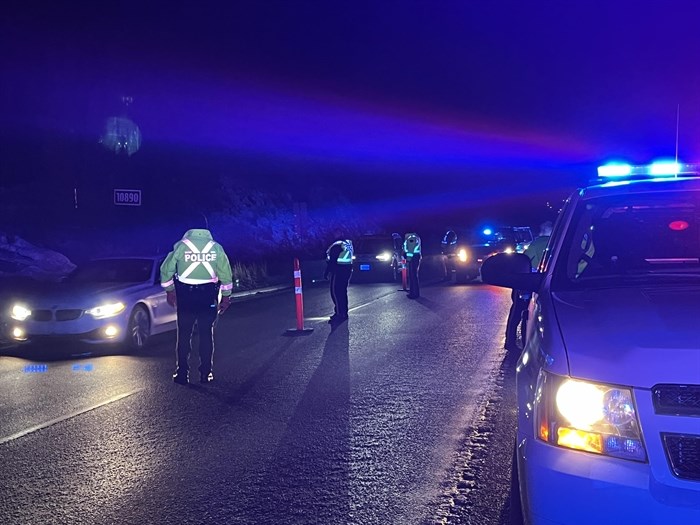Why B.C. RCMP isn't using its cannabis impairment testing kits

Roadside testing kits for cannabis impaired drivers have been approved for use in Canada, but have a mixed reception and limited use in B.C.
There are currently two devices approved by the federal government for police to use for catching drug impaired drivers, the SoToxa device and the Drager 5000.
The devices were approved for use more than four years ago, but aren’t widely implemented across Canada and people with knowledge on the subject have different explanations for why.
Const. James Ward from B.C. Highway Patrol said he wasn’t sure why the RCMP doesn’t have these testing kits roadside but there could be problems with consistency and performance in different environments.
“I don’t know, it’s probably because they don’t have anything that’s been tested across Canada and is guaranteed to work in cold environments and hot environments. One of the unique challenges the RCMP faces is our kit and equipment has to be compatible unilaterally across Canada. It has to work in rainy Vancouver and it has to work in frozen Nunavut. They have to go through an extensive testing and procurement process with the government whereas Vancouver Police Department can go and buy 30 of whatever they need for their guys while the RCMP has to get 10,000,” he said.
The drug testing kits are a complement to the standard field sobriety tests, and are a tool police can use to bring a driver back to the police station for more concrete testing like blood tests.
According to the most recent data from Jan. 27, 2023, in B.C. the RCMP purchased 15 devices in 2018 and 2019, 32 in 2020, and none in 2021.
READ MORE: B.C. Highway Patrol kicked off its counter impaired driving initiative last night
Law enforcement in B.C. has a total of 62 devices, but did not report using any of them in 2021. Seven provinces reported using the approved drug screening equipment; Alberta, Saskatchewan, Manitoba, Ontario, Nova Scotia, PEI, and Newfoundland and Labrador.
Use of the drug screening devices varied between provinces, for example Alberta used them eight times with four positive results, Saskatchewan used them 487 times with 257 positive results.
MADD Canada CEO Steve Sullivan says there are many reasons why the devices haven’t been rolled out throughout B.C.
“The reaction has been mixed. The law came in 2018 and then it requires training and police have to get comfortable with the new laws. Then of course there was the pandemic which kind of caused a halt on training for the newer devices. There have been some disruptions in the way things might have played out,” Sullivan said.
Sullivan says the devices are relatively new and there are different reasons why law enforcement in B.C. doesn’t use them.
“Like any new tool it has to work its way through the courts. I don’t know the specifics but I have heard anecdotally that there are some cases going through the courts,” he said. “From a law enforcement perspective these are not cheap devices when they do tests on one, the swab itself is expensive.”
The commercially available version of the Drager 5000 costs about $11,000 and the SoToxa costs about $5,000.
“I think the police are taking a bit of a wait and see strategy. Waiting to see, ‘is this technology going to evolve?’ But I think we are seeing more and more police services using the devices but we’re nowhere near the alcohol, the approved screening devices for alcohol.”
When the devices were first approved they received attention, but now, a few years later the devices have fallen out of the spotlight.
“Canada was one of the first countries to go down that road (of legalization) and one of the major concerns with that would be impaired driving but I think we talked about the devices because they were new. Anything that’s new and has that shiny new feel to it, so as far as the media and the public (the kits) were something they were interested in,” Sullivan said.
Sullivan says the technology is evolving but the exact discussions in the government are not made public.
“I think there is all kinds of research being done in terms of testing for cannabis. The discussions that take place between the drugs and driving committee and justice Canada are secret so I don’t know if there are any new developments,” he said. “As far as what’s coming down the pike people are far smarter than I would be able to answer that.”
The lack of drug screening equipment in B.C. is a topic surrounded by varying explanations and uncertainty coupled with a reluctance from police departments and manufacturers to answer questions.
Drager declined to comment or provide information about how police use its devices.
RCMP Headquarters, Vancouver Police Department and several other police departments who have used the kits declined to comment.
To contact a reporter for this story, email Jesse Tomas or call 250-488-3065 or email the editor. You can also submit photos, videos or news tips to the newsroom and be entered to win a monthly prize draw.
We welcome your comments and opinions on our stories but play nice. We won't censor or delete comments unless they contain off-topic statements or links, unnecessary vulgarity, false facts, spam or obviously fake profiles. If you have any concerns about what you see in comments, email the editor in the link above. SUBSCRIBE to our awesome newsletter here.



